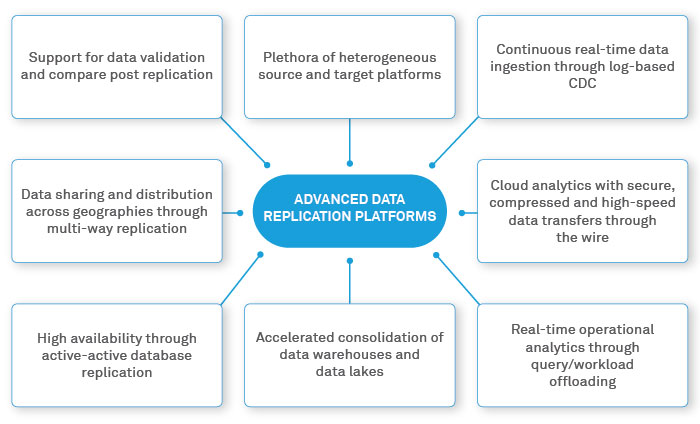It’s all about speed (but a controlled one), as to how quickly we can make the jump from raw data to actionable insights in the digital age.
This calls for access to the right data at right speed at the right time, in fact at all times to ensure there is continuous supply of source data coming into your analytics platform (on-premise and/or cloud) to prevent your actionable insights from going stale.
Traditionally, we have always had to write code to onboard or ingest any source data for analytics and continued with the same approach every time a new source had to be ingested.
Not anymore. The need for faster access to data in real-time is palpable. Advanced data replication platforms that enable configurable implementations with almost zero to minimal code approach to continuously ingest source data from operational/business transactional systems into analytical platforms anywhere within the customer landscape, are now a reality.
Figure 1 highlights key offerings and capabilities that come out of the box with such advanced data replication platforms.

Figure 1: Key capabilities of advanced data replication platforms
In summary, no matter what the use case is, if your goal is to accelerate the process of continuous ingestion of source data (structured and/or semi-structured) at high speed without having to spend a lot of time and money in building ETL/ELT pipelines, then the answer is to go for advanced data replication platforms.
Relatively, they are quite economical and bring in a great deal of value proposition in terms of capability, cost and productivity.
Industry :

Nayan R Gavaral
Practice Leader and Data Integration Architect -Data, Analytics and AI, Wipro
Nayan has more than 17 years of experience in the areas of Data Integration, Data Warehousing, Data Architecture and BI. He works closely with client architects, project delivery, solution design and consulting teams to ensure the success of technical/data integrations as part of joint customer solutions. In his previous roles, he has been involved in various data management architecture and implementation engagements across geographies and industry domains for a variety of customers.